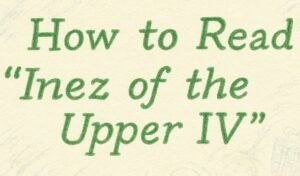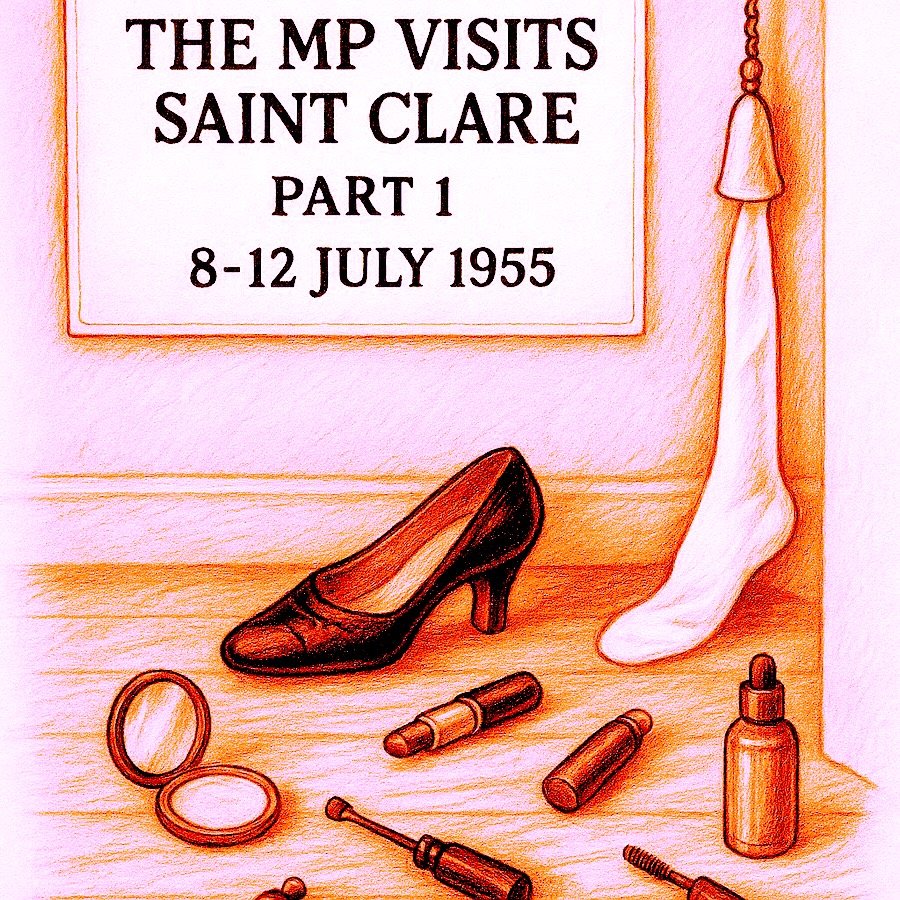2 comment(s) so far. Please add yours!
 And we’re back in 1955. Sorry about the time traveling. We will get back to Ned and Honour soon.
And we’re back in 1955. Sorry about the time traveling. We will get back to Ned and Honour soon.
Context is in Foreword below.
The story of Inez de Vries unfolds through a constellation of documents—some official, drawn from the prim and unforgiving files of Saint Clare’s School for Girls; others more intimate, taken from the journals, letters, and scribbled notes of the girls themselves. Some will appear typed and orderly; others retain the texture of handwriting, rendered in a cursive-style font.
Readers are invited to step into the role of archivist, assembling the story from these traces, and imagining the lives that fill the gaps between pages—the tensions, the alliances, the secrets too dangerous to write down. Not everything will be explained. But Inez is watching. And she remembers.
Note: Comments are read and much appreciated. Much as I like reading them on Twitter and Bluesky, I love getting them here, and promise to respond. Moreover your ideas and reactions also join the archives, where they may quietly shape what comes next..
Foreword
From the Archivist
If the Prologue shows Miss Williams after a disastrous morning at the Institute, the present entry shows the three days that led to it—days filled with small offences, smaller triumphs, and domestic tensions that simmered steadily from the 8th to the 12th. Birchwood is not a large house, but it proves more than large enough for misadventure.
When last we left Miss Gladys Williams, it was the night of 11 July 1955, as she lay awake in a fury: raw from her first morning at the Domestic Institute, smarting under Gerald’s tight-lipped decrees, and dreading the next day’s return to Saint Clare School for Girls.
Before we press on to the events of the 12th (where the scenes in the Headmaster’s office still leave Miss Kelley wincing in her private journal), we must step back. Gladys’s bewildered anger in that entry did not spring from nowhere. It was the culmination of several small misadventures, misjudgments, and more than one melodrama by post.
Readers may wish to revisit:
The Elwood Files — the failed attempt to slip Inez’s letter past the school authorities.
The Lady and the Headmaster — in which Lady de Vries learns just enough to become dangerously perceptive.
The Secret Letters, Part I — where Gladys first involves herself in a correspondence she might have been wiser to avoid.
Melodrama by Post — ending in Clarissa’s own very revealing postscript.
Heard in the Charrington Household — Miss Gladys, hauled home from Scotland, is made to “answer for herself.”
Gladys in Trouble — Gerald’s formal terms, Gladys’s formal compliance, and the informal tears that followed.
Yet between her 7 July return and that prophetic line on the 11th — “Apparently 25 is still old enough to be spanked by circumstance” — lies a small but significant gap: three too-warm, sticky, uncomfortable days during which
- Mrs Fielding’s patience was tested,
- young Elsie was driven to tears (twice),
- the milkman did not cometh,
- the vicarage was pressed into service for stamps,
- the Institute visit loomed like a thundercloud,
- and Miss Gladys Williams of St Albans ricocheted between fury, sulks, and the sort of despair that leads a young woman to accuse, with more heat than prudence, a certain lady of having set the entire chain of events in motion.
The documents that follow: Mrs Fielding’s notes, Elsie Turner’s account, Gladys’s own private scribblings, and an unfortunately not-so-private letter, restore that missing chapter. Together, they illuminate why the 11th felt to Gladys like a trap snapping shut, and how the stage was set for the catastrophe of the following day.
For the most attentive readers, it may also be worth glancing back at the 1938 Honour’s Game series:
- Honour’s Lesson – Young, newly-married Lady Gwen discovers her Darlington’s limits.
- Honour’s Game – This story goes back to 1938 and tells the story of Inez’s parents in the earliest days of their marriage.
Connections grow clearer in hindsight, though none of the players in 1955 yet understand how far the past reaches into their present.
Some of the documents reproduced below are drawn from the Blue Room Archives at Saint Clare, specifically from the Lady Gwen de Vries papers and from the Charrington household files.
The Notes of Mrs Dorcas Fielding, Housekeeper
8 to 11 July 1955, St Albans
 Friday, 8 July 1955
Friday, 8 July 1955
Since Mr Charrington and Miss Gladys came home yesterday, the house has been all upheaval. Miss Gladys stayed in her room most of the day, resting from her journey. Breakfast tray sent up at eight; returned at ten with only the toast disturbed. Luncheon laid in the dining room; untouched. At half past three she rang for tea and something sweet, then refused the scones as too dry.
Her untouched meals made me want to cry. It is a sin to waste good food.
Young Elsie Turner has been up and down the back stairs carrying trays that come back as full as they went up. I warned her not to show temper. It is not for us to say what a lady ought to eat. But I did begin reducing the portions. There is only so much that can be scraped into the pig bucket before it weighs on one’s conscience.
Mr Charrington kept to his study. He did not speak of Miss Gladys or ask whether she had come down to meals.
Saturday 9 July
Miss Gladys kept to her room again, though one could hear her walking about and the wireless going on and off. Breakfast was half-finished. When I asked at luncheon whether she might come down, she answered through the door that she had no appetite whatsoever but might manage something nice later if I brought up to her..
Something nice indeed.There is no cook in the house and no regular maid. I fear I did not trouble myself to invent “something nice” for her. There was not much in, and the butcher’s meat pies must stretch until Monday.
Near eleven, Miss Gladys left a letter addressed for Scotland and one for Mr. Charrington, dropping the envelop onto his desk. Elsie took the one sent to Scotland immediately and posted in the village. After reading it, Mr Charrington himself looking thunderous. I did not ask what Miss Gladys had written. It was not my place.
Supper was sent up by her request. Another untouched chop, only the pudding disturbed. Wicked waste of good food.
Sunday 10 July
There was still no milk to be had. I brewed the tea black and laid out breakfast myself, porridge and toast. With no cook, no regular maid, no fresh food in, and Elsie not due until eight, it was all I could manage.
Miss Gladys sent word that her head ached dreadfully and she was too unwell for services.I suggested she decide if she’s well enough, that perhaps she had a headache due to the lack of food. She didn’t reply but yanked her drawers. Mr Charrington went alone, which saved awkward explanations to the parish about her early return from Scotland.
Luncheon tray left untouched again, except for a bit of baked fruit.
It was midafternoon when the matter with the stamps came to light. Elsie came into the pantry looking near tears. When pressed she admitted Miss Gladys had rung for her and insisted she must have stamps this instant. Elsie told her the post office was shut, it being Sunday, but Miss Gladys said she was to go to the vicarage anyway.
I wish the record to show: I did not authorise this. The house keeps books of stamps in Mr Charrington’s desk. Miss Gladys simply did not wish to ask him.
Mrs Hargreaves at the vicarage was in the middle of preparing their dinner and was surprised to see the child, but gave her two stamps and said to tell Mr Charrington if more were needed. Elsie had not the face to explain it was Miss Gladys’s doing.
When Mr Charrington returned from Evensong, quite unlike him, he found Elsie blotchy and trying not to cry. I told him carefully that Miss Gladys had sent the girl on an unnecessary errand. His expression went cold as stone. He said that explained the vicar’s wife telling him after services that they were delighted to be of help. He went upstairs, the door shutting sharply.
After the supper tray came back untouched and Elsie had gone home, I heard his voice raised upstairs — sharp and clipped, the way men sound on the wireless when Parliament grows heated. I could not make out the words, only the tone, and then the quick slam of a door. A moment later he came down to the back hall, looking worn-out and deeply embarrassed.
He said, “Mrs. Fielding, I must apologise. Miss Williams has been… unreasonable. I am sorry she involved the girl today.”
I told him there was no need, that Elsie was only upset from being sent somewhere she oughtn’t to have been.
He nodded, ran a hand over his face, and then added — almost as an afterthought, though I am sure he meant it as a warning for arrangements — “We will be going to Saint Clare School on Tuesday, and then on to Bryn Derwen. We shall stay the night there.”
I thanked him for letting me know and asked how I might help. He said only that I should telephone Wales in the morning. I told him I would do it first thing, so they’d have time to get the house prepared.
He murmured his thanks — very quietly — and went back upstairs.
He dined alone.
Supper was laid. Miss Gladys did not appear. After demanding it, she left her tray untouched again, except for the pudding.
Monday 11 July
The milkman finally came, leaving two bottles and butter. I fetched them in at once. Elsie arrived at eight, still shaken.
Miss Gladys came down near nine, when Mr Charrington was finishing breakfast. I told her there was now milk for her tea. She looked at the table and said we ought to have cream for coffee as well. I told her the dairy sends cream only when asked, and we were fortunate to have milk at all after a week marked shut. She poured half the sugar bowl into her coffee and left most of the toast.
At half past nine, Mr Charrington and Miss Gladys left for the Domestic Institute in St Albans. They walked, as it is too close to drive, and he told her she would need to make the same walk every day once her course begins, as Fowler will be taking him to London.
They returned before three. I heard the front door close and Miss Gladys run upstairs without a word. Mr Charrington came through to the back hall and asked whether I had called Bryn Derwen, reminding me they would travel on there after visiting Saint Clare on Tuesday. I told him I had done so first thing.
Not half an hour later the bell from Miss Gladys’s room began ringing. She had been told she must go with him to the school and then on to Wales. She said she could not be ready by nine, had nothing suitable to wear, and required help with her packing at once.
Her room was a shambles: stockings on the floor, frocks flung across the bed, dressing table covered in powder and scent. After she finally left it took me almost three hours to set everything to rights. I told her as gently as I could that with the cook and regular maid still on holiday and Elsie only a child, the house was mine alone to manage, and assured her that at five and twenty she was capable of packing a small case herself.
She sat on the bed and cried that no one understood her and that this was all the fault of Lady de Vries, setting Gerald on her like a dog. I almost asked who this “Lady DeVries is when she’s at home but bit my tongue and made no reply.
By seven the suitcase was closed after much fuss and three changes of mind. Elsie lugged it down stairs, poor child, and set it in the front hall, ready for morning.. Supper was laid; she did not come down. I sent no tray. I then sent Elsie home, telling her she need not come back until midday on Tuesday, long after they had left. I fear she almost cried with relief, poor lamb.
I stayed up preparing a small hamper for the morning: sandwiches, cheese, biscuits. The last of the lemon curd. I discovered all the tins of shortbread had been eaten by Miss Gladys so perhaps she won’t perish from starvation after all..
Signed,
D. Fielding
Statement of Elsie Turner, Temporary Housemaid
Taken down by Mrs Dorcas Fielding.
11 and 12 July 1955
On Sunday Miss Gladys rang for me and said she needed stamps this instant. I told her the post office was shut, it being Sunday, but she said I was to try anyway and go to the vicarage. Mrs Hargreaves was surprised to see me, but she was kind and gave me two stamps. She said to tell Mr Charrington if more were needed, but I did not like to say it was Miss Gladys who had sent me.
Before I left, I heard Mr Charrington speaking sharply upstairs. I do not know what he said, only that he sounded like the men on the wireless when they argue in Parliament. It frightened me. I had never heard him raise his voice. I went to the scullery and cried over the sink until Mrs Fielding found me and said it was not my fault, and that important men put their trousers on one leg at a time like anyone else. That made me smile.
On Monday, when Miss Gladys found out she had to go to Saint Clare and then to Bryn Derwen, she kept ringing for me to fetch hatboxes, scarves, gloves, and to stand and hold things while she tried on frocks. By the time Mrs Fielding sent me home, my legs were shaking from the stairs.
Signed,
Elsie Turner
From the Diary of Miss Gladys Williams
9 to 10 July 1955
9 July 1955
No one understands how awful it is to be dragged home as if I were a schoolgirl. Gerald is acting like a warder. Dorcas keeps looking at me as if I am an invalid or a nuisance. The whole house smells of dust. There is nothing fit to eat. I am sure she is sending up the plainest things on purpose.
10 July 1955
I tried to rest but the bells kept ringing and the air was stifling. Gerald went to church alone, which looked odd, I am sure. I could not face people whispering. I asked for stamps because I could not think what else to do. The whole house feels against me. I am beginning to think Gerald has planned this as a sort of campaign, and I have fallen into it like a fool.
Everyone is cross. Everyone is watching. I do not know what to do except write to Lady Gwen. She has always been kind. She will understand how impossible this is.
Letter from Miss Gladys Williams to the Countess de Vries
Filed in the Lady Gwen de Vries Archives, Blue Prefect Study

Evening of 10 July 1955
My Dear Lady Gwen,
You asked me to call you Gwennie. Can I still?
I hardly know how to begin. Everything has gone wrong, and if I sound agitated it is only because no one here listens. I have never felt so misunderstood, even when I was a child of seven or eight at Saint Clare, newly arrived after the accident. Margaret had just left, and I remember you then, blond and glorious, the Head Girl everyone admired. You bent down to ask me if I was all right. I was crying in the cloakroom and you were the only one who noticed. I have never forgotten that. I would not trouble you were I not feeling so lost and undone!
Everything since I was summoned home from Scotland has gone wrong. Gerald scarcely looks at me except with that cold certainty he gets when he believes someone has “advised” him. He never explains. He simply decides, and I am expected to obey, as if I were a schoolchild again.
Everyone else seems to hover. Mrs. Fielding watching with that pursed-lip expression. The little maid trembling as if I might strike her. Even the vicar’s wife made a remark that felt—well, as though something had been passed along.
I trusted you completely. But now I feel as if my life has come undone, and I cannot deny it all began the day you spoke to Gerald about our email prank at the Palace Fête. I know you meant well, of course you did, but after that he changed. Whatever you said to him that day has burrowed under his skin. He would not say how or why, only that I must come home at once, and since then he has spoken to me as though I were twelve. Could you have not guessed that would happen before you revealed all? Why did you do such a thing to me?
I don’t mean to accuse. I don’t. But still I cannot ignore that everything began to go wrong after you became involved.
Being sent to that Institute.
Being expected to walk there like a shopgirl.
Being paraded back to Saint Clare.
All the way! To Wales—without so much as a by your leave or even asking what I want. Or considering I might have my own plans
I do not know what to think. I trust you. Truly, I do. But I cannot understand why this is happening or why Gerald is treating me so coldly. I feel I have lost my footing. I do not know where I stand with anyone. If I have disappointed you somehow, I beg you to tell me. I will do anything to put things right.
Yesterday he said — very calmly, very final — that he is taking me back to Saint Clare on Tuesday, and then on to Bryn Derwen, without asking whether I wish it. As though my wants no longer exist. As though I am cargo being shuttled from place to place so that others may examine me.
I cannot shake the feeling that something is being arranged around me.
Something I was not meant to see.
Something already decided.
You are the only one who can help me fix this! I am sure we can work this out between us if only you will write soon. If you do not, that will be my answer.
Yours sincerely,
Gladys L. Williams
Afterword
From the Archivist
Thus closes a day that did Miss Williams no favours. The morning to come promises further instruction, domestic and otherwise, as Birchwood makes its views known with unhelpful clarity.
Next in sequence: The Road to Saint Clare
The relevant documents appear in the next post.


Another excellent addition to the ongoing adventures. I love the different perspectives and how the bigger picture is revealed from each point of view.
Thank you! I’ve been working hard to get the next installment ready to post. Hopefully later today. It always hopes to know people are reading / following.